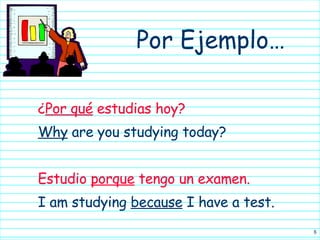Interrogativas
- 1. Las Palabras Interrogativas ¿Quién? ¿Qué? ¿Cuándo?
- 2. Las palabras interrogativas ¿ Cómo estás? How are you? ¿De dónde eres? Where are you from? ¿ Quién es ella? Who is she? We are already familiar with several words used for asking information questions:
- 3. Todas las palabras interrogativas … ¿Qué? ¿Quién? / ¿Quiénes? ¿Cuál? / ¿Cuáles? ¿Cómo? ¿Cuándo? ¿Cuánto? (a / os / as) ¿Dónde? ¿Por qué?
- 4. Pero, ¿ qué significan ? ¿Qué? ¿Quién? / ¿Quiénes? ¿Cuál? / ¿Cuáles? ¿Cómo? ¿Cuándo? ¿Cuánto? (a / os / as) ¿Dónde? ¿Por qué? What? Who? Which (one / ones)? How? When? How much / many? Where? Why?
- 5. Por Ejemplo… ¿ Cuál es tu mochila? * Which (one) is your backpack? ¿ Cuáles son tus libros? * Which (ones) are your books? * Cuál / Cuáles are used to choose from among a group
- 6. Por Ejemplo… ¿ Quién es de Argentina? * Who is from Argentina? ¿ Quiénes son ellos? * Who are they? * Quién / Quiénes get singular / plural answers
- 7. ¿ Cuánta tarea hay en la clase de español? How much homework is there in Spanish class? ¿ Cuántos estudiantes hay en la clase? How many students are in the class? Por Ejemplo…
- 8. ¿ Por qué estudias hoy? Why are you studying today? Estudio porque tengo un examen. I am studying because I have a test. Por Ejemplo…
- 9. Por Ejemplo… ¿ Cuándo es el concierto de rock? When is the rock concert? ¿ Qué es esto? What is this? ¿ Dónde están mis libros? Where are my books?
- 10. ¿Qué? ¿Quién? ¿Quiénes? ¿Cuál? ¿Cuáles? ¿Cómo? ¿Cuándo? ¿Cuánto? ¿Dónde? ¿Por qué?
- 11. Tengo una pregunta… Carlos está en la biblioteca. s v There are several ways to ask a question in Spanish, besides using question-asking words. One way is to simply place the subject after the verb, and change the inflection of your voice: ¿ Está Carlos en la biblioteca? v s
- 12. Hay una fiesta en el colegio mañana. Tengo otra pregunta… Sometimes the written question marks and the rising tone of the speaker’s voice alone may indicate the difference between a statement and a question: ¿Hay una fiesta en el colegio mañana?
- 13. Hay una fiesta en el colegio hoy, ¿verdad? There is a party at school today, right? … Y tengo otra pregunta… Sometimes you can add a tag word such as ¿no? or ¿verdad? to the end of a sentence, much as you might add right? , don ’t you? , etc., in English: Pedro está enfermo, ¿no ? Pedro is sick, isn’t he?
- 14. ¿ Cuándo es el concierto de rock ? v s … Y una pregunta más… When forming information questions with any of the interrogative words ( ¿cómo?, ¿cuál?, etc.), the verb precedes the subject, just as in English: El concierto de rock es el lunes. s v
- 15. ¿ A qué hora es la fiesta? La fiesta es a las nueve de la noche. … Y aún una pregunta más… The interrogative words may be used alone or in combination with various prepositions: ¿ De dónde es él? El es de Chile.
- 16. When answering questions, pay attention to the verb form . The verb form in the answer will be based on the question. If the question is asked of you, the answer is in the I form. If the question asks about him , then the answer is also about him , etc. EVERY sentence (answer) must have a subject and a verb . Preguntas y respuestas…
- 17. yo tú / Ud. tú yo él / ella él / ella Ud. yo nosotros Uds. / nosotros vosotros nosotros ellos / ellas ellos / ellas Uds. nosotros Answer Question
- 18. ¿Estudias mucho en la escuela? ¿A qué hora tienes el almuerzo hoy? ¿Hay mucha tarea en la clase de inglés? ¿Ellos hablan mucho en clase? ¿Necesitamos los libros para la clase de español? ¿Camino a la escuela? ¿Vosotros bailáis mucho? ¿Ud. busca un cuaderno? ¿Uds. llevan los libros a la clase? ¿Estás en la clase de historia? Y la respuesta es…
- 19. Terminamos…


















